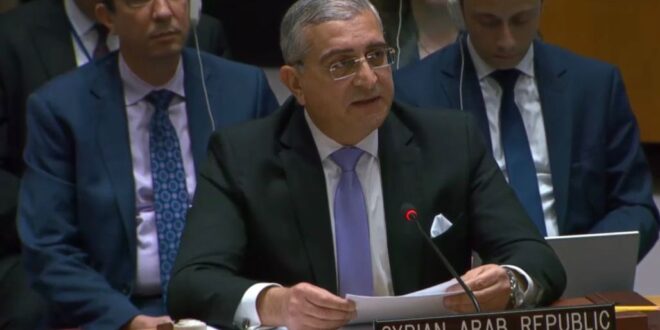Western countries’ hostile policies affected the UN’s ability to implement early recovery projects to support the Syrian people, says Al-Dahhak
Syria’s Permanent Representative to the United Nations Qusay Al-Dahhak has affirmed that the hostile policies of some Western countries, represented by their illegal military presence on Syrian territory, their support for militias and terrorist organizations, their plundering of Syria’s national wealth, their imposition of coercive measures and their politicization of humanitarian and development work have caused serious harm to the United Nations’ ability to carry out its responsibilities in the field of humanitarian work and to implement early recovery projects to support the Syrian people. He noted all the facilitations provided by Syria to partners in humanitarian and development work.
Al-Dahhak made the remarks during today’s Security Council meeting on the political and humanitarian situation in Syria. He said that Syria believes in partnership with the United Nations and its member states, and in strengthening bilateral and multilateral cooperation in a way that supports the efforts of the Syrian state to improve the living conditions of Syrians and provide them with basic services.
Al-Dahhak asserted that Syria is committed to providing facilitations to partners in the humanitarian and development work, as it renewed license to the UN to use Bab al-Hawa crossing for extra six months to help deliver aid to needy civilians in the northwest parts of Syria.
He went on to say that Syria is pressing ahead with its efforts to facilitate the return of the displaced persons and refugees, noting that hundreds of refugees have returned over the past few days from Lebanon, which proves once the falsity of Western propaganda in this aspect.
Al-Dahhak pointed out that cooperation between Syria and the United Nations is not at the required level due to the Western countries’ hostile stances and violations of the international law and UN Charter.
He clarified that ESCWA’s committee’s last report on the coercive measures imposed on Syria is an additional step that uncovers the disastrous effects of these measures and refutes allegations promoted by those who imposed the blockade.
He renewed Syria’s call for immediate and complete lifting of coercive measures and providing sustainable funding to help the United Nations implement its humanitarian response plan as well as the projects scheduled within the strategic framework that regulates cooperation between Syria and the United Nations.
Hamda Mustafa

